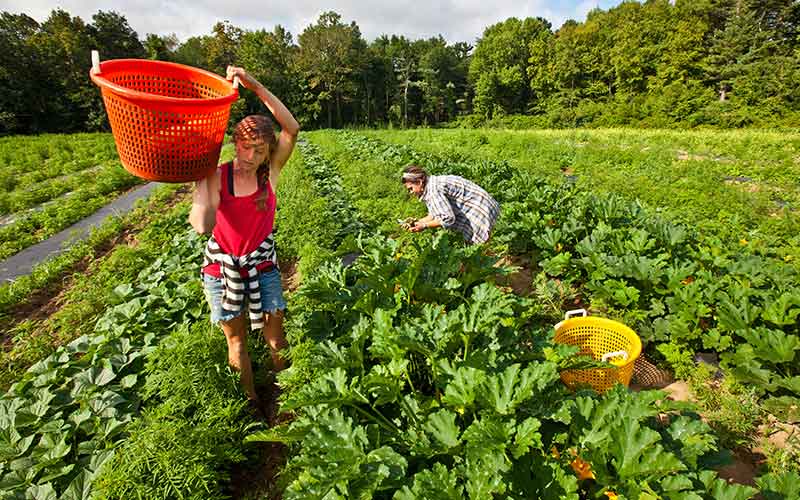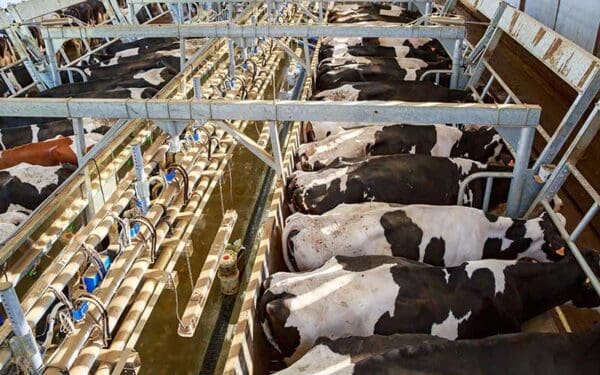
CLF's new guide to employment law will help small farmers understand the rights and responsibilities of both farmers and employees.
Sarah Turkus knows firsthand how difficult it can be to navigate complex legal issues while running a busy small farm. Sarah has been a farmer and youth educator since 2010 and, in her latest endeavor, manages a nonprofit cooperative farm that opened in 2018. In preparing for the farm’s launch, Sarah wanted to ensure that she had a clear understanding of the legal rights and responsibilities of both the farm owners and its employees. With her demanding schedule, however, she simply did not have the time to get up to speed on the numerous employment laws affecting her farm.
She’s not alone. The reality is that small farmers usually lack the time and resources to tackle many legal matters head-on. To help farmers like Sarah, CLF’s Legal Food Hub has released a new guide that makes it easier for them to comply with state and federal employment laws – so they can spend more time growing and producing delicious local food, and less time trying to navigate these complex laws on their own.
Farm Employment Law is Complicated
In Rhode Island, over 90 percent of farms qualify as small farms, growing and selling between $1,000 and $250,000 of agricultural products per year. The state has become a leader in small farm growth in the United States, and this has created a boon for consumers craving local food. To meet this demand, our farmers work tirelessly and face numerous hurdles every day. While many of these challenges are unpredictable or beyond their control, such as low production yields and increasingly extreme weather, others should be more manageable, such as following the letter of the law when hiring an employee or intern.
However, following the letter of the law isn’t always easy because many exceptions and exemptions apply to agricultural work. For example, under both U.S. and Rhode Island employment laws, agricultural employees are exempted from overtime pay requirements if they are doing farm work. That means an employee would not get paid overtime for planting or harvesting work but would when working a stall at a weekly farmers’ market.
Also, even though many farmers call their workers “interns,” federal law prohibits for-profit farmers from hiring people for unpaid internships unless seven specific criteria are met. Rhode Island state law goes even further and prohibits for-profit farms from using volunteers. Usually, this means that all workers at a for-profit farm must be paid as employees unless they qualify as interns under the law. However, many farmers don’t even know that these laws exist and may unintentionally fail to comply with them.
CLF’s New Guide Aims to Help Farmers Navigate Employment Law
Overtime pay and internship requirements are just a few of the employment issues often overlooked or misunderstood by small farmers. Developed in collaboration with Rhode Island employment law attorney Gina DiCenso, the Legal Food Hub’s new employment guide provides an overview and summary of common employment law issues. These include workers’ rights, how a farmer must pay their employees, what time off employees are entitled to, workplace safety requirements, and best practices for employee handbooks. The guide also lists useful resources that farmers can consult for more information. Also, farmers can reach out to the Legal Food Hub for help in navigating these legal issues.
Understanding employment law is essential to protect both farmers and their employees. Ultimately, CLF’s new guide will help our busy small farmers like Sarah Turkus succeed by making it easier for them to understand and address employment law issues proactively. The guide is free to download here. We hope you’ll share it with your local farmers and farm workers so they can spend more time farming and less time dealing with legal issues. The more we can support our farms and farmers, the stronger we can make our local food economy.
CLF works to support New England’s farmers and a sustainable, vibrant local food system. Our Legal Food Hub program offers free legal assistance to eligible farmers and food entrepreneurs through our network of volunteer attorneys. Find out more at www.legalfoodhub.org.




